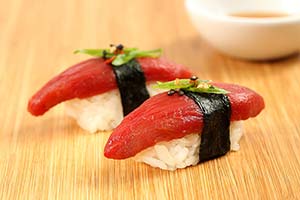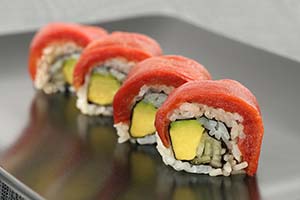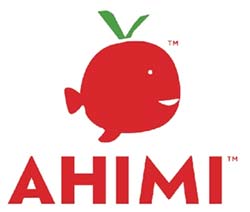No, it’s not sashimi – it’s Ahimi ” (Ahi is the Hawaiian word for yellowfin tuna, and mi means spirit in Japanese)! Created after four years of development by Chef James Corwell and presented as “a sustainable alternative to tuna, the faux fish product is offered as a component in sushi, sashimi, nigiri, maki rolls, poké, tartare, ceviche and other dishes.
 Most visitors sampling Ahimi at the Ocean Hugger Foods stand during the recently held Seafood Expo North America in Boston were surprised to learn that Corwell’s 100% plant-based recipe consists of tomato, soy sauce, sugar, filtered water and sesame oil. Produced in Mexico and distributed in frozen form, it comes in 1.67-pound packs.
Most visitors sampling Ahimi at the Ocean Hugger Foods stand during the recently held Seafood Expo North America in Boston were surprised to learn that Corwell’s 100% plant-based recipe consists of tomato, soy sauce, sugar, filtered water and sesame oil. Produced in Mexico and distributed in frozen form, it comes in 1.67-pound packs.
The chef perfected a proprietary “slow and low cooking” process to transform tomatoes, which contain high levels of naturally occurring glutamic acids, into “vegan sushi” that’s reddish-pink in color and “puts forward the taste and texture of raw Ahi tuna.”
The product was initially launched through Whole Foods Market outlets in November of 2017, and is now available in other stores and restaurants as well as corporate dining rooms and college cafeterias across the USA and Canada.
 Marketed as “Japanese-style Ahimi halves,” the culinary innovation may be used as a replacement for raw or lightly smoked fish. Portions are created by cutting straight down the middle and trimming at the edges, as desired. All that sushi chefs or kitchen assistants have to do is place thawed slices over a small ball of cooked sushi rice and add nori, ginger and/or wasabi to taste.
Marketed as “Japanese-style Ahimi halves,” the culinary innovation may be used as a replacement for raw or lightly smoked fish. Portions are created by cutting straight down the middle and trimming at the edges, as desired. All that sushi chefs or kitchen assistants have to do is place thawed slices over a small ball of cooked sushi rice and add nori, ginger and/or wasabi to taste.
The product has received favorable reviews from a number of food critics, including this comment published by The Daily Beast: “I tried a few pieces of the final product, and it’s convincing. The texture and look are spot-on, and a friend could not tell the difference between Ahimi and raw fish.”
Meanwhile, New York City-headquartered Ocean Hugger Foods is developing additional plant-based faux seafood products. Two new items, Sakimi, a carrot-based salmon alternative, and Unami, an eggplant-based eel alternative, will be rolled out later this year.





